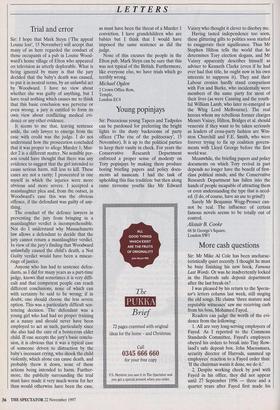LETTERS Trial and error
Sir: I hope that Mark Steyn (`The appeal Louise lost', 15 November) will accept that many of us here regarded the conduct of those occupants of a pub in Louise Wood- ward's home village of Elton who appeared on television as utterly deplorable. What is being ignored by many is that the jury decided that the baby's death was caused, to put it in neutral terms, by an unlawful act by Woodward. I have no view about whether she was guilty of anything, but I have read nothing which causes me to think that this basic conclusion was perverse or even wrong; a jury is entitled to form its own view about conflicting medical evi- dence or any other evidence.
It seems to me that, leaving sentence aside, the only lawyer to emerge from the case with credit was the judge. I do not understand how the prosecution concluded that it was proper to allege Murder 1; Mur- der 2 is a different matter. No sensible per- son could have thought that there was any evidence to suggest that the girl intended to cause serious harm, still less to kill. These cases are not a rarity; I prosecuted in one myself in which the injuries were more obvious and more severe. I accepted a manslaughter plea and, from the outset, in Woodward's case this was the obvious offence, if the defendant was guilty of any- thing.
The conduct of the defence lawyers in preventing the jury from bringing in a manslaughter verdict is incomprehensible. Nor do I understand why Massachusetts law allows a defendant to decide that the jury cannot return a manslaughter verdict. In view of the jury's finding that Woodward unlawfully caused the child's death, a Not Guilty verdict would have been a miscar- riage of justice.
Anyone who has had to sentence defen- dants, as I did for many years as a part-time judge, knows that sometimes it is very diffi- cult and that competent people can reach different conclusions, none of which can with certainty be said to be wrong; if in doubt, one should choose the less severe option. This was a particularly difficult sen- tencing decision. The defendant was a young girl who had had no proper training as a nanny and should never have been employed to act as such, particularly since she also had the care of a boisterous elder child. If one accepts the jury's basic conclu- sion, it is obvious that it was a typical case of someone driven to distraction by the baby's incessant crying, who shook the child violently, which alone can cause death, and probably threw it down, none of these actions being intended to harm. Further- more, the publicity surrounding the trial must have made it very much worse for her than would otherwise have been the case, as must have been the threat of a Murder 1 conviction. I have grandchildren who are babies but I think that I would have imposed the same sentence as did the judge.
None of this excuses the people in the Elton pub. Mark Steyn can be sure that this was not typical of the British. Furthermore, like everyone else, we have trials which go terribly wrong.
Michael Ogden
2 Crown Office Row, Temple, London EC4


















































































 Previous page
Previous page